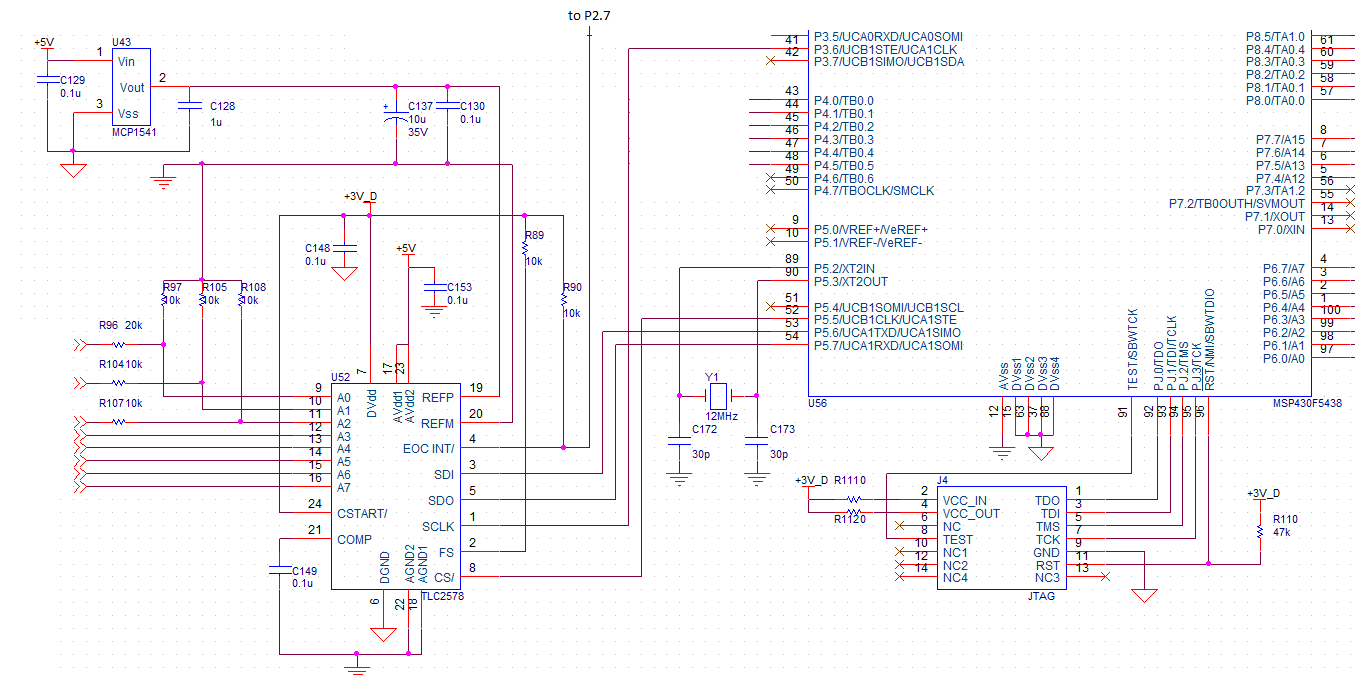I'm having trouble getting my ADC to respond with an output. My code pertaining to the ADC is as follows:
P3SEL = 0x70; // P3.4-6 = USCI_A0 TXD,RXD; USCI_A1 CLK
. . .
P5SEL = 0xEC; // Enable XT2 Ports, Enable USCI_A1 SIMO,SOMI
. . .
// Clock Setup
UCSCTL6 &= ~XT2OFF; // Enable XT2
UCSCTL3 |= SELREF_2; // FLLref = REFO
UCSCTL4 |= SELA_2; // ACLK=REFO,SMCLK=DCO,MCLK=DCO
do // Loop until XT1,XT2 & DCO stabilizes
{
UCSCTL7 &= ~(XT2OFFG + XT1LFOFFG + XT1HFOFFG + DCOFFG);
// Clear XT2,XT1,DCO fault flags
SFRIFG1 &= ~OFIFG; // Clear fault flags
}while (SFRIFG1&OFIFG); // Test oscillator fault flag
UCSCTL6 &= ~XT2DRIVE0; // Decrease XT2 Drive according to expected frequency
UCSCTL4 |= SELS_5 + SELM_5; // SMCLK=MCLK=XT2
. . .
// TLC2578 Setup
UCA1CTL1 |= UCSWRST; // **Put state machine in reset**
UCA1CTL1 |= UCSSEL_2; // SMCLK
UCA1CTL0 |= UCMSB + UCMST + UCSYNC + UCMODE_2; // Synchronous, Master, MSB First, 4-pin AL
UCA1CTL1 &= ~UCSWRST; // Starts state machine
. . .
// Timer Setup
TA0CCTL0 = CCIE; // Interrupt Mode
TA0CCR0 = 49152-1; // 49152 cycles -> 3 s timer
TA0CCTL1 = CCIE; // Interrupt Mode
TA0CCR1 = 8192-1; // 8192 cycles -> 0.5 s timer
TA0CCTL2 = CCIE; // Interrupt Mode
TA0CCR2 = 12288-1; // 12288 cycles -> 0.75 s timer
TA0CTL = TASSEL_1 + MC_1 + ID_1 + TACLR; // ACLK, up, Input Divider = 2, clear TAR
. . .
// TLC2578 Init
unsigned char trash;
UCA1TXBUF = 0xAA; // Sends bits 15-8
while(!(UCA1IFG & UCTXIFG))
trash = UCA1RXBUF;
UCA1TXBUF = 0x40; // Sends bits 7-0
while(!(UCA1IFG & UCTXIFG))
trash = UCA1RXBUF;
. . .
#pragma vector=TIMER0_A0_VECTOR
__interrupt void TIMER0_A0_ISR(void)
{
unsigned char trash;
// TLC2578 Trigger Sequence
UCA1TXBUF = 0x08; // Sends bits 15-8
while(!(UCA1IFG & UCTXIFG))
trash = UCA1RXBUF;
UCA1TXBUF = 0x40; // Sends bits 7-0
while(!(UCA1IFG & UCTXIFG))
trash = UCA1RXBUF;
// Internal ADC Trigger Sequence
ADC12CTL0 |= ADC12SC; // Start internal ADC conversion
}
. . .
#pragma vector=TIMER0_A1_VECTOR
__interrupt void TIMER0_A1_ISR(void)
{
int data1 = 0;
int data2 = 0;
UCA1TXBUF = 0xE8; // Sends bits 15-8, FIFO Read
while(!(UCA1IFG & UCTXIFG))
data1 = UCA1RXBUF; // Store bits 15-8
UCA1TXBUF = 0x00; // Sends bits 7-0
while(!(UCA1IFG & UCTXIFG))
data2 = (UCA1RXBUF & 0xF0); // Store bits 7-4, discard 3-0
V27Supply = (data1*256+data2)/16; // Combine into 12-bit result
*(This is repeated for multiple channels)
}
Any help would be appreciated.


